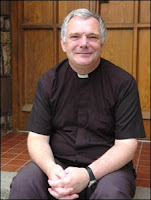A few years ago, on October 14, 2008, a story was published in the British newspaper The Telegraph about a Methodist pastor in North Wales, the Rev. Derek Rigby, who shamed his own congregation by dressing up as a homeless man and sitting on the front steps of his own church on a Sunday morning dressed in old clothes, dirty, hidden beneath a wig, smelling from beer which he had poured all over his clothes. Rev. Rigby then settled on a pew in the church, surrounded by syringes and began drinking from a can of beer. None of the worshippers at his church spoke to him or offered him any help. Eventually, the 51-year-old pastor then took off his wig to reveal his true identity, before delivering a sermon based on the failure of the disciples to recognize Jesus Christ on the road to Emmaus after his resurrection. Rev. Rigby later commented on the incident, saying, “It was interesting to see the reaction from people - I was totally ignored. It showed that we don't recognize God at work and in each other.”
At Bethel, we talk a lot these days about radical hospitality. We strive to be more welcoming to visitors, to have a more appealing welcome zone, to be more competent in our knowledge about other cultures, and to more intentionally serve the needs of the community around us. But how radical is our hospitality really? And is our hospitality about being nice and kind or is it connected to justice?
In biblical times, hospitality and justice went hand in hand; radical, justice-oriented hospitality was a foundation of all morality in biblical times. Take for example, the following verses from the prophet Isaiah:
"Is not this the fast that I choose: to loose the bonds of injustice, to undo the thongs of the yoke, to let the oppressed go free, and to break every yoke? Is it not to share your bread with the hungry, and bring the homeless poor into your house; when you see the naked, to cover them, and not to hide yourself from your own kin? Then your light shall break forth like the dawn, and your healing shall spring up quickly; your vindicator shall go before you, the glory of the Lord shall be your rear guard. Then you shall call, and the Lord will answer; you shall cry for help, and he will say, Here I am." (Isaiah 58:6-9)
Serving the poor, sharing our bread with the hungry and helping the homeless to secure housing, are – according to God – the kind of religious ritual (“fast”) that he prefers. When we are following his word in such a way, God’s glory will reveal itself to us.
Jesus, too, modeled such radical hospitality when he opened the banquet table to all. Everyone is welcome to the wedding feast; all are entitled to feast abundantly at God’s banquet table and not just gather the crumbs that fall off the table.
My hope for our first service worship is that we may not simply serve other less fortunate individuals, but that we truly allow God to change us in the process of such service. My hope is that we serve AND listen and that we hear God’s voice in the voices spoken to us throughout the day.
Let my close by quoting Seattle pastor to the homeless mentally ill community, Craig Rennebohm, who wrote that “we care for the soul of the world by caring for the souls of our neighbor, for each life that touches ours” (Craig Rennebohm and David Paul, Souls in the Hands of a Tender God: Stories of the Search for Home and Healing on the Street, p.175). May we be truly touched this Sunday by God and we serve God’s children!




No comments:
Post a Comment